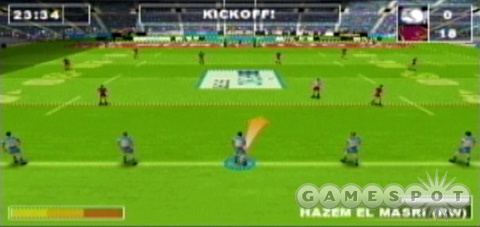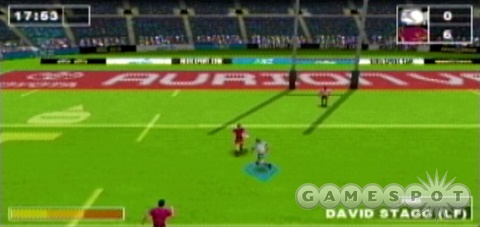Rugby League games have been few and far between over the past couple of years. Fans of the sport basked in the glory of 2005's Rugby League 2 on the original Xbox and PlayStation 2 consoles, but the franchise's lack of an update has left fans clamouring for more since its release. It's disappointing, then, that the latest effort to bring the sport to consoles is such a poor one, mixing dodgy AI, shallow gameplay, a lack of multiplayer support, and dud production values.
At face value, the game ticks all the right boxes. It features the complete licensed 2009 player rosters for the 16 National Rugby League teams, and 14 teams in the UK Engage Rugby League competitions. It offers both quick matches and full season mode. It also gives players the chance to take on the role of player and coach as you steer your side toward victory on and off the field. Unfortunately, the latter claim falls well short, and coaching is limited to doling out in-game training dollars before each round to upgrade the stats of your players. There's no player fitness or match form to manage here, and because there's no carry-over penalty system, you'll never worry about having to front for the tribunal for repeat tackle offenses.
Player attributes are split into eight categories: strength, speed, accuracy, stamina, kick, tackle, pass, and handling. At the easiest of the three difficulty settings, your players will start the season with many of their skills already well established. This means only minor improvements to their performance need to be made over the course of the year as you devote money to training them. Pumping up the speed and stamina of your players is the best way to allocate your training cash and allows players a burst of energy as you cut through the opposition's defensive line. Raising their stamina level will allow them to prolong their sprint. Though it may not necessarily be your first thought, cranking up the pace of your front-rowers will yield unexpected results. Though the sprint function doesn't always kick in with the button press as it should (despite depleting your stamina bar), once it does, heavy forwards will sometimes outpace lighter and faster wingers and halfbacks.
Football is as much about the facts and figures as it is about kicking the ball around on the grass. The game tracks your team's wins, losses, points for/against, and goal difference, as well as displays the information before each match. Unfortunately, there's no way to view or compare the performance of individual players. It's disappointing given your involvement in training individuals to preen their best results. Likewise, once you've completed the season, there's no way to replay a game, relive the thrill of the grand final match, or continue developing your team's skills. Starting a new season will reset your player stats, and you'll be forced to build them up from scratch. There's also no multiplayer offering to be found here, which is a disappointing omission given the clear potential for head-to-head matches with friends over the PSP's wireless networking.

When you play on the easy difficulty, there's very little strategy required. After receiving the ball, you can usually run straight-ahead without the need to fend off CPU players. Sprinting through small holes in defence will often see tacklers run into their own teammates, fall over, or run parallel alongside you without intercepting. Dummy half-defenders seldom tackle, and it's not uncommon to see score lines in the three-digit range. Your team is smart enough to tackle even if you don't, but the self-destructive CPU will usually mess things up, running the ball on the fifth tackle rather than kicking or passing back to a marked player on its team. This occurs even when it has a clean pair of heels and simply needs to cross the line to ground the ball.
Conversions are as simple as lining up your shot with an onscreen arrow and stopping the power meter at the appropriate point. There's no wind or ball swing to worry about, and even from the sideline, you'll kick dead straight through the sticks. Medium and hard difficulty modes are significantly more challenging and see the CPU tackling earlier, which requires you to pass the ball around. Medium difficulty offers the least offensive combination of AI defensive aggression and offensive ball play, but it's still common to see your opponents turn the ball over all too easily or throw away try-scoring opportunities. At the hard difficulty, you'll face strong, early tackles and spend most of your time struggling to get into the opposition's half to avoid handling errors from your own players. Fumbles from low-handling skill levels often result in conceded points.
The game camera follows the ball rather than the player and means you'll often be running blind as you attempt to scoop up your cheeky chip to ground it over the line. Penalty kicks for touch from the centre of the field mean you won't be able to see where you're kicking most of the time, and while there are a handful of camera presets to cycle through, you'll need to go with the real time strategy-style top-down view to see your whole team at once.

Rugby League Challenge's gameplay is lacklustre at best, and the game's second-rate visuals and audio don't do anything to help rectify the situation. There's no audio commentary, and while a guitar-heavy rock track plays during menus, there's no soundtrack during matches. This leaves you with only the two similar-sounding tackle sound bites as players crash into each other, the referee whistles, and a cheering crowd rumbles while you crash over the line to score a try. Despite being a licensed product, there are no videos of the game's flesh-and-blood players in action or cutscenes. The only form of encouragement you'll receive for successfully winning a match is the rather sterile "Congratulations Match Won" static image flashed up on screen. Fans of the UK league are even worse done by as player photos have been replaced with generic character renderings in the team selection. Character animations alternate between smooth jogging and clunky shambles as you lurch around the field. Player jerseys don't include numbers, so you'll need to rely on the name that appears next to the stamina bar at the lower part of the screen if you care who has the ball.
The game only features two venues: Sydney's ANZ Stadium with its towering seating and plastering of advertiser banners and a second nondescript field. The latter is a suburban oval complete with parked cars and a handful of emotionless crowd occupying stands at either end. We can only assume it's developer Wicked Witch's take on the smaller capacity home grounds, but it ends up feeling somewhere between kicking the ball around the local park with buddies and gate-crashing the pitch of an under-10's game on a Saturday morning.
Ultimately, the game's all-or-nothing difficulty, dodgy camera, and lack of compelling reason to return once you've completed a season makes Rugby League Challenge extremely hard to enjoy regardless of how well you play it. If you like your Rugby League games, give this one a miss and dust off your copy of Rugby League 2 instead.